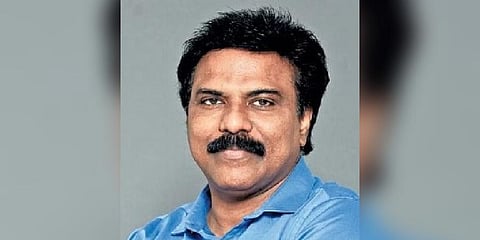

THIRUVANANTHAPURAM: With the official launch of the state government’s ambitious Kerala Fiber Optic Network (K-FON) project set for Monday, TNIE speaks to Dr Santhosh Babu, managing director of Kerala State IT Infrastructure Ltd and K-FON, on the project’s future and revenue model, & the controversies surrounding it.
What is your take on allegations of corruption raised by the Opposition over the project, primarily due to the involvement of Bengaluru-based SRIT India Pvt Ltd?
K-FON is working transparently by adhering to all of the state government’s tender procedures.
It only deals with the consortium led by Bharat Electronics Ltd (BEL) and SRIT is part of the consortium. In addition, the request for proposal (RFP) process and Kerala Infrastructure Investment Fund Board (KIIFB) rules are stringent, so each and every process will ensure transparency.
All the funds go from KIIFB to BEL. If any issues crop up, KIIFB will not allow it to proceed further. If BEL issues a bill, it is scrutinised by a third party. Here, the third party, Telecommunication Corporation of India Ltd (TCIL) will verify it meticulously. This process will take time. KIIFB will also verify it afterwards. I am answerable to these observation memos or scrutinisation processes at different levels.
Since all these processes are stringent, transparency is ensured. We have no direct relationship with SRIT.
Do you think the multi-level scrutinies will affect the pace of implementation?
Yes, they have affected the utilisation of funding. Nearly 97% of the infrastructure is in place. Yet, financing is at 60%. I have made a request with the government. This is not about cash flow, which is happening. I have not been able to fund the contracts due to stringent tender conditions. Otherwise, I could have readied the project last year.
How optimistic are you about the future of the project?
The main goal of K-FON is to provide internet connections in areas where other service providers have not accessed. We will make available affordable connections for both households and government offices.
What about its revenue generation potential?
We need to generate income from our own services as we cannot always depend on the government. So, we are working out the commercial aspects.
As part of our revenue-generation plans, K-FON is in talks with private service providers. We have a massive network. We can monetise all or part of it by leasing out the fibres to other service providers, such as Airtel, Asianet, Kerala Vision, and so on.
This is one revenue model. The second involves internet leased lines. The `200 crore capital infusion by the government will be our initial lifeline.
With the project in the launch stage, how much progress has been achieved?
As part of the initial phase, the local self-government department has selected 14,000 households, which will be provided free internet services, in 140 assembly constituencies. We have already linked up 1,383 households.
This is a tedious process as there is a survey that has to be carried out. However, the surveys and the process of providing connectivity are progressing simultaneously, and it will be done on time.